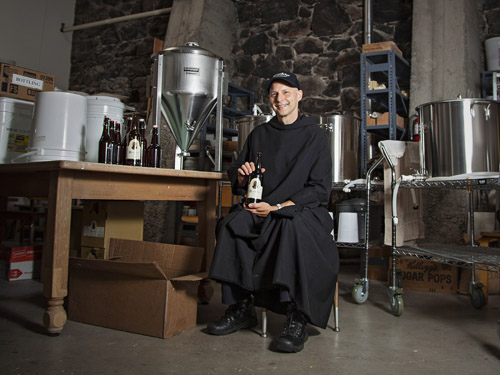BY VIVIAN MCINERNY
Craft beer comes to Mount Angel.
 BY VIVIAN MCINERNY | PHOTO BY JESSE BROWN
BY VIVIAN MCINERNY | PHOTO BY JESSE BROWN
Reverend Martin Grassel crosses the grounds of the monastery wearing a long, black, hooded monk’s habit and a baseball cap. Embroidered above the brim in fancy script are the words “Benedictine Brewery.” That’s the brand name of the craft beer the Catholic monk and his 50-plus band of brothers living at Mount Angel Abbey aim to produce and sell for revenue.
“Expenses are like weeds,” says Grassel, the abbey’s procurator. “Revenue, you have to cultivate.”
Benedictine monasteries maintain a tradition of self-sufficiency dating back to the first century. The Oregon abbey established in 1882 has supported itself through an ever-evolving combination of endeavors that have included a dairy, a printing press, the seminary college, leasing land, and farming trees.
A couple years back, Grassel proposed several new revenue-generating ideas to the monks for consideration. The notions of a columbarium, vineyards and conservation easements were quickly nixed. Grassel hesitated to suggest the brewery proposal. The monks had recently dissolved a business partnership that had essentially licensed their names to a big beer maker.
“That experience,” says Grassel, “left a bad taste in everyone’s mouths.” But this time was different. This time they would not simply be devout mascots for a big corporation but would establish and operate their own independent craft brewery. The monks would provide labor. The abbey well could provide pure water. Hops, already cultivated on abbey lands, would provide an essential ingredient. The idea was immediately and almost unanimously embraced by the group.
“This felt genuine,” says Grassel. “It had authenticity.”
Most importantly, it felt in keeping with the spirit of reasonableness and moderation established by St. Benedict as rules for monastic life. But these modern monks weren’t about to launch a business based on a wing and a prayer.
They drew up a plan with their advisory and foundation board, took in risk assessment and set goals and budgets for a high-tech, five-barrel, craft beer brew system. They developed recipes with experts at Oregon State University and worked with Brand Navigation of Sisters on a marketing strategy. Their first beer was produced by a contract brewer in a small batch, and sampled and sold at food and drink festivals to positive reviews.
“It’s not something to party with; it’s something to enjoy,” says Grassel.
Their label on their first dark ale, cleverly called Black Habit, features an iconic image of St. Benedict painted by a priest at the Mount Angel monastery, and the tagline “Taste & Believe.” It also includes this explanation: “Consisting of tunic, scapular, hood and cincture, a monk’s attire is called a habit. Among Benedictines, they are traditionally black, signifying the monk has died to this world to live with Christ. Whether over the body or in the body, the black habit reminds all of us of our higher purpose.”
And also: “Using hops and pristine water from Oregon, we believe every bottle should be brewed to the glory of God.”
Reading the fine print on a can of PBR isn’t quite so philosophical. “We saw it as an opportunity to get our values out to the community,” says Grassel, who notes the success of the business can’t be measured in dollars alone.
Monasteries have been turning water into wine and beer for their own use since the first century. It began as a means of purifying water that was often contaminated and unsafe to drink. By the time people learned that simply boiling water would do the trick, they’d acquired a taste for the drink and the making of alcohol had become something of an art. St. Arnold, 580-640 A.D., is credited for saying, “From man’s sweat and God’s love, beer came into the world.” That’s heady praise for a pint.
The priest and monks at Mount Angel cultivated hops themselves up until the 1970s, and the flowering plant, an essential ingredient in beer, is still grown on their leased lands. Oregon is the second-largest hop producer in the U.S. after Washington. Oregon grows about 17% of the total U.S. crop, according to the Oregon Hop Commission, and that represents about 5% of the hops worldwide.
The Benedictines of Mount Angel have yet to launch a full-scale brewery on their own turf. The process was slowed somewhat when the cost of a seismic upgrade on their centurion stone building proved prohibitive. But they’ve finally settled on a newer structure just down the hill in a building that formerly housed the Traeger Wood Pellet Grills business. It’s still part of the monastery property but falls within the limits of the city of Mount Angel, which simplifies the bureaucratic process for the proposed brewery and tasting room. It also preserves the monastery as the home for priests and monks, a school and library for students, and a quiet place for visitors to reflect on God. At maximum production capacity, the brewery is expected to gross between $1.2 and $1.5 million annually.
The fact that the business is still in the fermentation process doesn’t much bother Grassel, who notes their tree farm crop can require 70 years before harvest, and the Benedictine order itself continues 900 years after it was first established.
“What’s the rush? We live forever,” he says with a smile.

